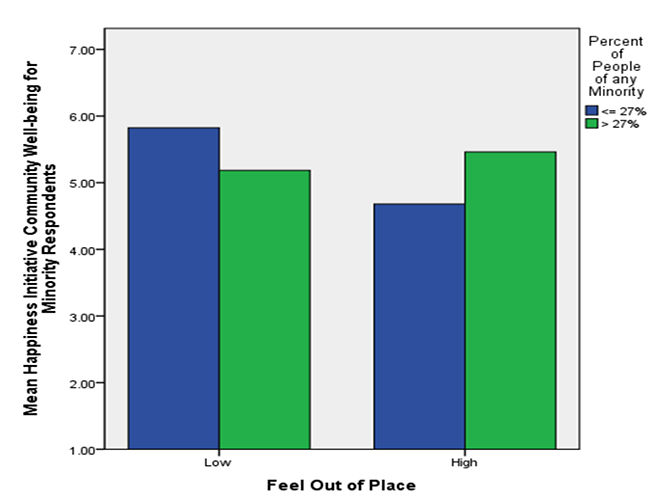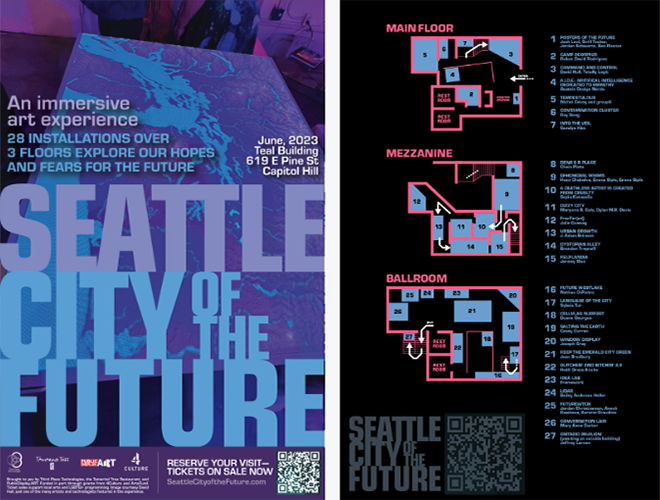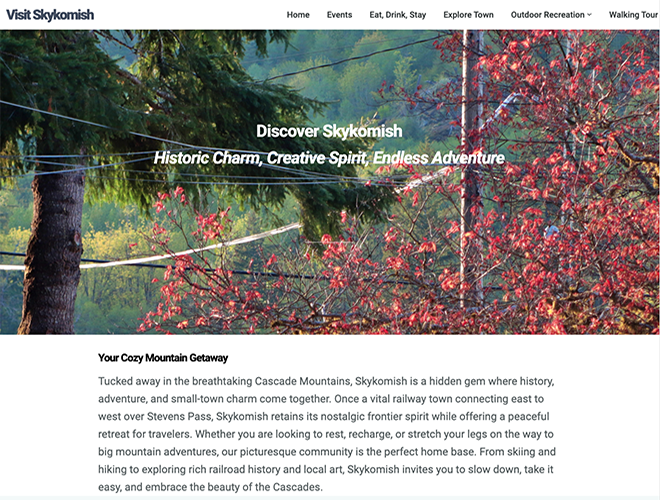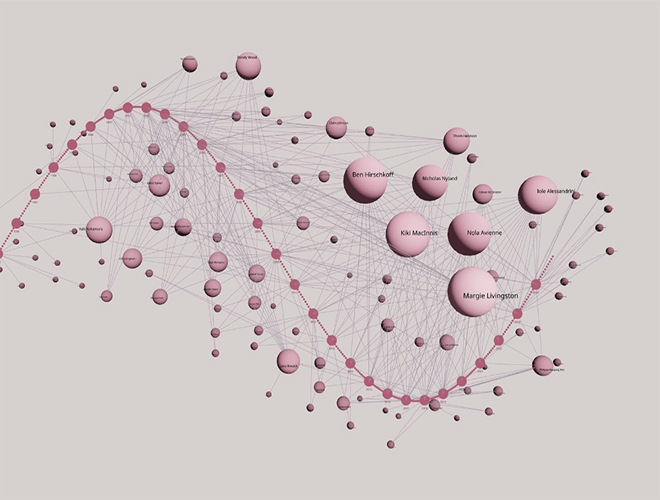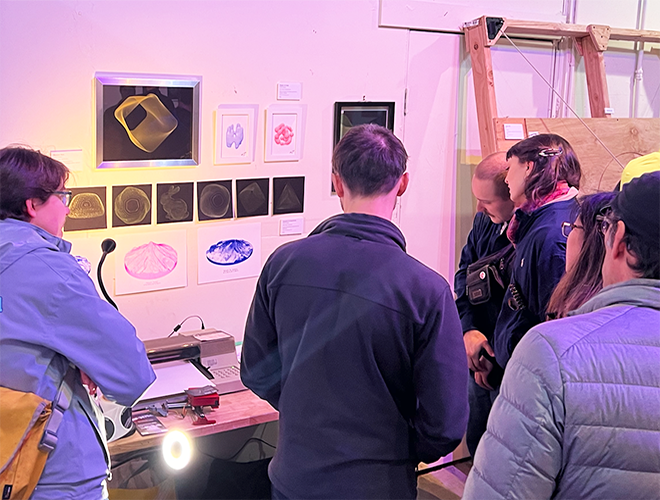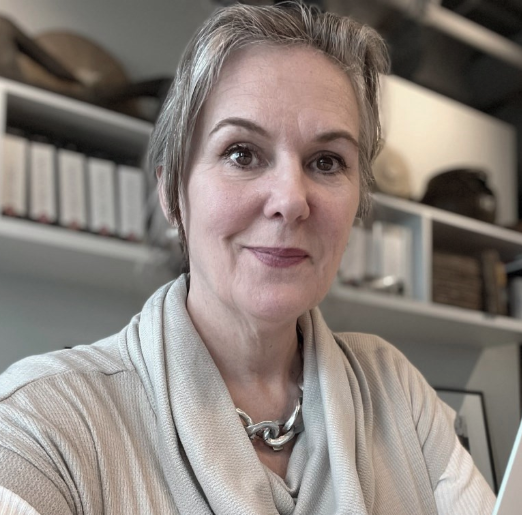Building capacity and providing technical assistance, specializing in strategy, research, design and development for creative, collaborative communities and communications.
Our Third Place Consulting Group is composed of members of the founding leadership of Third Place Technologies, who are excited to leverage their unique skills, expertise, and connections with the non-profit sector to consult for similar non-profits, government, or community organizations in the region. We have extensive experience working together with complementary skills that provide holistic solutions in the domain of community and communications strategy, research, design and development.
Our core value is recognizing community as the driving force behind nonprofit and public sector success. Through consulting work, we aim to build capacity and offer technical assistance, focusing on community development via communications strategy, social media and branding, community-informed research and planning, and knowledge-sharing events. Our team’s strength lies in our ability to navigate and connect across diverse communities and cultures. We are committed to respecting diversity, celebrating differences, and connecting around shared values — emphasizing inclusive, community-driven engagement in both urban and rural contexts.
Third Place Consulting Group Principals
Shelly D. Farnham, PhD
- Community Psychologist
- Innovation Researcher
- Artist & Creative Tech
- Community Organizer
Thought leader and interdisciplinary practitioner at the intersections of technology, research, art, and community development.
Genevieve Tremblay, MFA
- Innovation Catalyst
- Educator
- Researcher
- Artist
Versatile creative leader, researcher and catalyst working at the intersection of arts, science and technology to bring direction and clarity to transformational initiatives.
Jeffrey Larson, BFA
- Senior Graphic Designer
- Brand Manager
- Illustrator
- Artist
Designer, illustrator, and artist specializing in translating complicated technical products and concepts into clear, compelling visuals.
Aside from our principal consultants, we have an extensive network of colleagues with creative, collaborative talent we can engage to help us meet your needs.
Recent or Most Related Community Technology Projects by our Principals

Skykomish Tourism and Business Assistance
- Dates: 2024-2025
- Location: Skykomish, WA
- Project Lead: Shelly Farnham via Town of Skykomish
- Project Type: Technical Assistance
- Funded by: Port of Seattle, matched by Town of Skykomish
In 2024 Shelly Farnham worked with the Town to define a project based on community needs, applied for the grant, and then administered the project through a partnership with the local design group Seco Design / Karen Molesky.
Website Development and Promotion with Social Media Integration
For this project, in order to support local tourism our primary task was to perform a tourist website redesign based on community feedback. We started with a community focus group of key stakeholders to articulate the site goals, profiled our target users, and mapped out the informational elements, such as Skykomish’s attractions, activities, and amenities. We then developed design recommendations including the new information architecture of the new site, with high quality photos, engaging content, and user-friendly navigation. At this time, the first draft of the site is now complete, and we are currently engaging in another round of feedback and site revision. Next steps will be SEO, and social media integration.
Small Business Assistance
A secondary task for this project was to engage in small business assistance, with “Internet Clinics” and workshops that help small local businesses including artisans and community organizers get up to speed with communication, collaboration, and social media tools so they could strategically engage with online marketing on a small budget. Shelly Farnham has already hosted an introduction to Google Docs workshop, and Genevieve Tremblay will be hosting an introduction to Instagram workshop in May.

Rootworks Atlas: Digital Archive and Community Mapping Platform
- Dates: 2024
- Location: Maine
- Project Lead: Genevieve Tremblay via Catalytic Innovators Group
- Project type: Community Research and Design
- Funding: NEA’s ArtHERE Grant
Rootworks Atlas is a key initiative within Indigo Arts Alliance’s Strategic Growth and Sustainability Plan. The project aims to create a cutting-edge digital archive to preserve and amplify the contributions of Black and Brown artists in Maine and beyond. Through innovative data visualization, community mapping, and interactive storytelling, Rootworks Atlas will serve as an accessible platform to promote these artists’ work across artistic, academic, and public sectors. By fostering community engagement, driving economic development, and expanding educational resources, the archive will strengthen cultural resilience and increase global access to diverse artistic legacies. Long-term sustainability will be achieved through partnerships, grants, and new funding opportunities, ensuring Rootworks Atlas becomes a vital resource for both local and global audiences.

Mapping SOIL’s Legacy: A Living Archive of Artist-Run Innovation
- Dates: 2023-Present
- Location: Seattle, WA
- Project Lead: Genevieve Tremblay via SOIL Gallery
- Project type: Community Mapping
- Funded by: 4Culture
This ongoing initiative explores the rich, 30-year history of SOIL Gallery, an influential artist-run space in Seattle, through an interactive digital archive. The project traces the artistic journeys of over 170 current and former members since SOIL’s founding in 1995, utilizing cutting-edge cultural data visualization, linked open data, and interactive mapping. The first phase of the project, funded by 4Culture’s Heritage Collections Care Program, ensures that SOIL’s cultural contributions remain visible, accessible, and relevant to curators, researchers, and institutions across the global semantic web. Led by SOIL member Genevieve Tremblay, in collaboration with José de la Parra and Rachel Wright, this digital archive not only preserves SOIL’s legacy but also provides an innovative platform for future generations to engage with the gallery’s history of artist-run innovation.
Link to Archive: https://soilart.org/membership-archive

Seattle: City of the Future
- Dates: 2023
- Location: Seattle, WA
- Project Leads: Jeffrey Larson (Branding), Shelly Farnham (Event Production)
- Project type: Immersive Art Experience — Event Production + Branding and Marketing
- Funded by: Third Place with 4Culture & Community Catalyst Grants, in-kind by Tamarind Tree
In 2022 Tam Nguyen, owner of the Tamarind Tree, acquired the former R Place building in Capitol Hill, Seattle. He wanted to activate the space during renovations, and organized a meeting of local art groups to brainstorm ideas for how to honor the site’s legacy as a beloved, historic LGBTQ+ venue. We proposed an immersive art experience bringing in local artists and asking them to consider their hopes and fears for the future of Seattle. Six months later, collaborating with Tam Nguyen and media partner Public Display (Marty Griswold), we launched the Seattle: City of the Future juried art show — featuring 38 installations over three floors and nearly 50% LGBTQ+ artists—creating inclusive, celebratory branding while activating the space for the local community.
Branding Project Summary
We developed cohesive branding, promotional materials, and environmental signage. Inspired by the iconic design language of the 1960 World’s Fair, the branding set a nostalgic yet forward-looking tone, providing a unifying framework for over 40 local artists to present their visions of Seattle’s future. This blend of retro aesthetics and futuristic themes drew audiences into a dynamic exploration of innovation and possibility. Multi-colored posters were embedded in the local neighborhood in pride flag colors.

Communities and Technologies Conference ’21
- Dates: 2021
- Location: Skykomish, WA
- Project Lead: Shelly Farnham, Conference Cha
- Project Type: Event Production
In 2021 Shelly Farnham served as Conference Chair for the International 2021 Communities and Technologies, a biannual academic conference bringing together leading researchers and practioners at the intersection of communities and technologies. The conference was originally to be held at the University of Washington, but was hosted entirely online due to the Covid-19 pandemic. See C&T ’21: Proceedings of the 10th International Conference on Communities & Technologies – Wicked Problems in the Age of Tech, Florian Cech and Shelly Farnham (Editors).

Skykomish Tourism Walking Tour
- Dates: 2019
- Location: Skykomish, WA
- Project Lead: Shelly Farnham via Town of Skykomish, Karen Molesy Seco Design
- Project Type: Technical Assistance / Website Development / Fundraising
- Funded by: Port of Seattle, matched by Town of Skykomish
In 2019 Shelly Farnham worked with the Town to define a project to support local tourism, wrote and secured the grant from the Port of Seattle, and then administered the project through a partnership with the local design group Seco Design / Karen Molesky.
For this project, in order to support local tourism our primary task was to create an online walking tour that integrated with Town’s pre-existing historic walking tour. The online walking tour integrated with the physical locations through signage and QR codes.
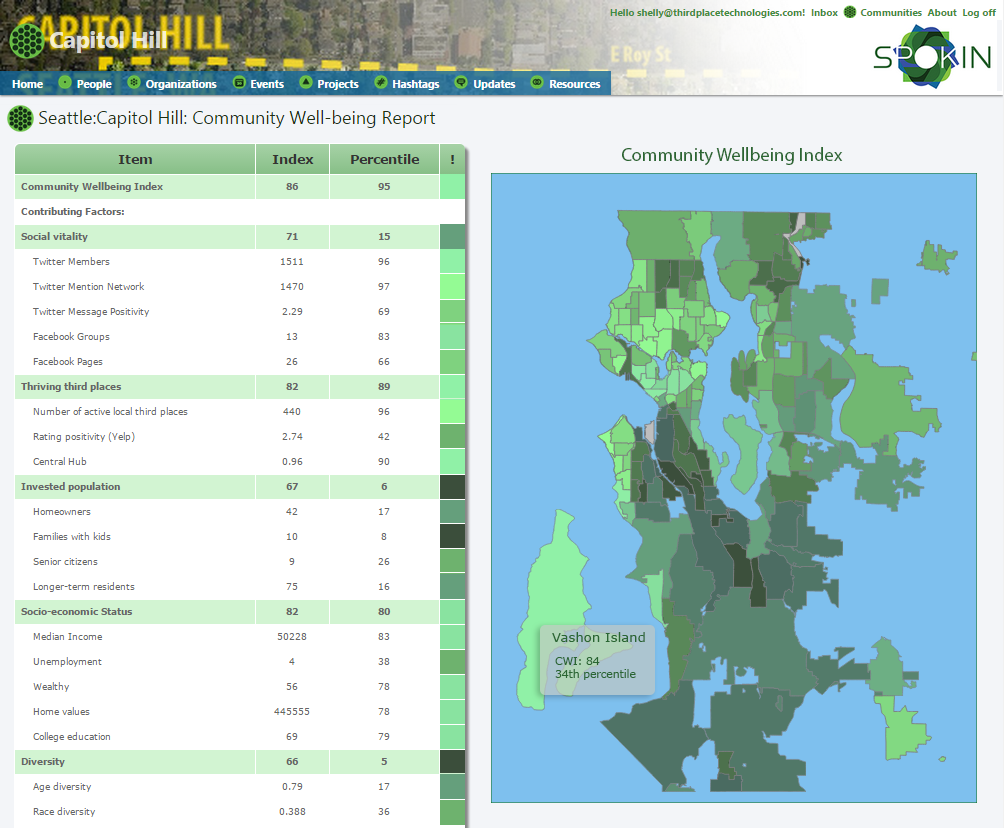
Spokin
- Dates: 2013-2016
- Location: Seattle, WA
- Project Leads: Shelly Farnham, Michal Lahav (Cornish)
- Project type: Field Study and Community Analytics
Spokin was an online web site with community-curated networking, allowing you to connect with your local communities — your neighborhood, city, or nearby interest groups — so you can work together to get things done. This was an experimental internal project, we expired Spokin in 2018 to shift our focus to collaboration spaces and events. Shelly Farnham created prototype with design by Jeffrey Larson, building on the community well-being report pages project. See Spokin Intro Slides.
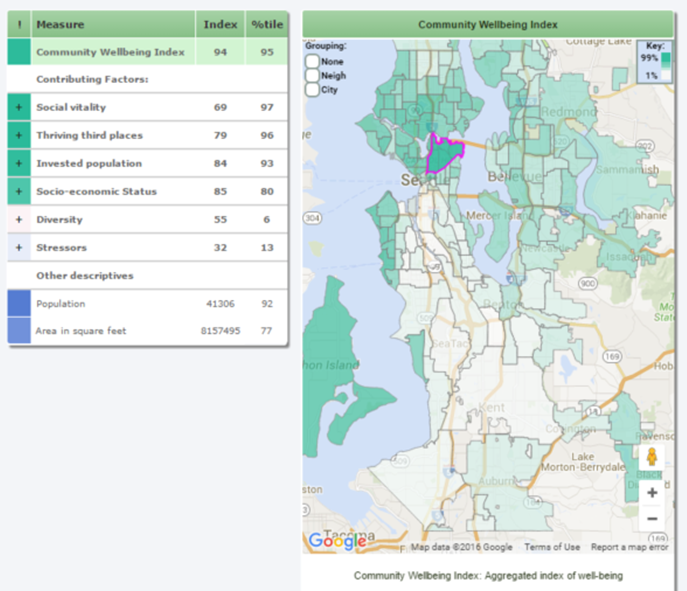
Community Well-being Report Pages Using Open Data and Social Media
As a part of the Data Science for Social Good summer incubator program at the UW eScience Institute, we created neighborhood community report pages in the context of our hyperlocal, crowd-sourced community network (Spokin). A key aspect of this project was to explore novel ways to leverage diverse social media and open data sources to dynamically assess community-level well-being. Shelly Farnham was lead for this project with interns in the summer incubator program.
See our end of summer project summary slides or Spokin Intro Slides.
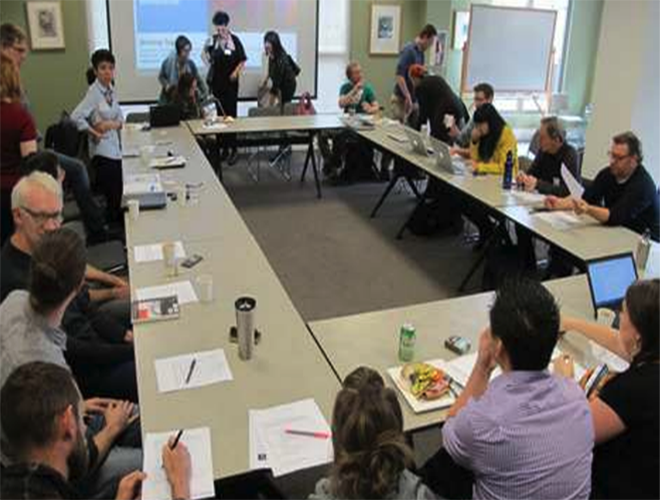
Fostering a Community of Innovation at the Intersection of Art and Technology
- Dates: 2014-2015
- Location: Seattle, WA
- Project Leads: Shelly Farnham (Microsoft Research), Genevieve Tremblay (Cornish)
- Project type: Community Engaged Research for Strategic Planning
To help foster the growing community of artists/technologists in the Pacific Northwest, we organized a workshop bringing together key stakeholders in the region, as a collaboration between Microsoft Research, Cornish College of the Arts, and the Genius Foundation. The workshop was structured as a focus group including a brief questionnaire to generate feedback for how to best support this community.
Farnham S., Brice, J., Tremblay, G., & Pinto da Silva, A. (2015). Fostering a Community of Innovation at the Intersection of Art and Technology in the Pacific Northwest. ISEA 2015.
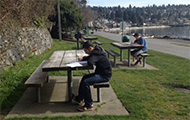
Neighborhood Study
- Dates: 2013-2015
- Location: Seattle, WA
- Project Leads: Shelly Farnham, Michal Lahav (Cornish)
- Project type: Field Study and Community Analytics
In this study, performed by Shelly Farnham and Michal Lahav while at Microsoft Research, we adopted a multi-method approach to examine whether the growing use of social media as a channel for hyper-local conversation may provide meaningful insights into the well-being of neighborhood communities. First, through interviews and a questionnaire we explored what are indicators of neighborhood level well-being, and what are current communication practices around the use of social media to support community well-being. Second, through an analysis of neighborhood-level Twitter messages we examined the extent to which Twitter conversations corresponded with our neighborhood well-being indicators.

The Data is In: How to Improve your Neighborhood Community’s Wellbeing (Ignite Talk)
Presentation Summarizing Research
As a citizen, a community organizer, or a local business, what can you do to improve the wellbeing of your neighborhood community? This talk outlines the most impactful ways to improve your neighborhood based on our years of research. Presentation by Shelly Farnham. See youtube video here.

Analyzing Social Media Data: Tools and Tips
- Dates: 2015
- Location: Seattle, WA
- Project Leads: Shelly Farnham
- Project type: Knowledge Sharing
The goal of this lecture was to provide practical tips for collecting and analyzing social media data. We originally developed this lecture/course for CHI 2013, and have subsequently given it as an invited speaker to a number of programs (including University of Washington, Syracuse, and University of Michigan). Presentation by Shelly Farnham
See slides.
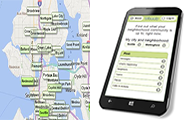
Whooly (Now Spokin Updates): What’s Happening in Your Hyperlocal Community on Twitter
- Dates: 2013
- Location: Seattle, WA
- Project Leads: Shelly Farnham (Research), Yuheng Hu (Prototype)
- Project type: Prototype and Study
While at Microsoft Research we developed and evaluated Whooly, an experimental web service that provided neighborhood-specific information based on Twitter posts that were automatically inferred to be hyperlocal. Whooly further automatically extracts and summarizes hyperlocal information about events, topics, people, and places from these Twitter posts. We tested the usefulness of the system as a tool for finding neighborhood information through a lab study.
See paper or online prototype (now Spokin Updates).
Hu, Yuheng, Farnham, S., Monroy-Hernandez, A. (2013). Whoo.ly: Facilitating information-seeking for informal hyperlocal communities using social media. In Proceedings of CHI, 2013. Honorable Mention.
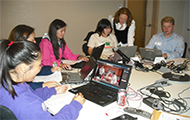
So.cl as Learning Network
- Dates: 2012
- Location: Seattle, WA
- Project Leads: Shelly Farnham, Michal Lahav at Microft Research
- Project type: Deployment Study
Microsoft Research
So.cl is a FUSE Labs, Microsoft Research experimental web application that combines web browsing, search, and social networking for the purposes of sharing and learning around topics of interest. We performed a deployment study examining existing learning practices around search and social networking for students, and how these practices shifted when participants adopted So.cl
Farnham, S., Lahav, M., Raskino, D., Cheng, L., Ickman, T., Laird-McConnell, T. (2012). So.cl: An interest network for informal learning. In Proceedings of ICWSM 2012. Best Paper Nomination.

Youth Civic Engagement and Social Media
Microsoft Research / City of Seattle
- Dates: 2012-2013
- Location: Seattle, WA
- Project Leads: Shelly Farnham, Microft Research; David Keyes, City of Seattle
- Project type: Deployment Study
Large Scale Questionnaire Study
While at Microsoft Research and in collaboration with the City of Seattle, we performed a large scale questionnaire study examining factors that impact teen civic engagement through social technologies.
Farnham, S., Keyes, D., Yuki, V., Tugwell, C. (2013). Modeling youth civic engagement in the new world of networked publics. In Proceedings of AAAI International Conference of Social Media and Weblogs.
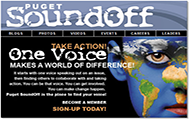
Puget Sound Off and Youth Citizen Journalism
Dates: 2011-2012
Location: Seattle, WA
Project Leads: Shelly Farnham, Microsoft Research; David Keyes, City of Seattle
Project type: Deployment Evaluation Study
Puget Sound Off is a City of Seattle online blogging and networking site focused on helping youth connect, collaborate, and take action around local community issues. We performed an evaluation study for the City of Seattle seeking lessons learned from a real world deployment.
Farnham, S., Keyes, D., Yuki, V., Tugwell, C. (2012). Puget Sound Off: Fostering youth civic engagement through citizen journalism. In Proceedings of ACM 2012 CSCW.

Docs.com: Social File Sharing in Facebook
Dates: 2011-2012
Location: Seattle, WA
Project Leads: Shelly Farnham, Microsoft Research
Project type: Usage Analysis
This usage analysis of Docs.com was performed while at Microsoft Research. Docs.com integrates Microsoft Office web documents with Facebook. We examined how people share docs in the context of a social network, including types of documents shared, and how people used the relationship sharing settings. We further performed a factor analysis of user activity to find four primary types of usage – sharing, creating, collaborating, and consuming.
Farnham, S. D., Turski, A., Halai, S. (2012). Docs.com: Social file sharing in Facebook. In Proceedings of Sixth International AAAI Conference on Weblogs and Social Media.
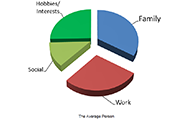
Faceted Identity and Life Modes in Social Media
Questionnaire Study and Design Probe Lab Study at Yahoo!
Dates: 2010-2011
Location: Seattle, WA
Project Leads: Shelly Farnham, K. Ozenc, Yahoo!
Project type: Usage Analysis
Performed a large scale questionnaire study for Yahoo! examining how people facet their identities, and how these facets are expressed through use of email and Facebook. We found family was an extremely important context for sharing online, that email was still a preferred form of communication for private sharing across facets of life, and a higher level of facet incompatibility was correlated with increased email usage and worry about sharing in social networks. We then performed a design probe lab study to solicit user feedback for different design solutions for faceting identity across social media tools.
See slides, faceted identity paper, or life modes design probe paper.
Farnham, S. & Churchill, E. F. (2011). Faceted identity, faceted lives: Social and technical issues in being yourself online. In Proceedings of Computer Supported Cooperative Work, 2011.
Ozenc. K. & Farnham, S. (2011). Life modes in social media. In Proceedings of CHI 2011.
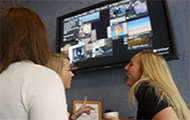
Cocollage: Networking Tool for “Third Place” Community Development
- Dates: 2010-2011
- Location: Seattle, WA
- Project Leads: Shelly Farnham, Joseph McCarthy, for Strands
- Project type: Longitudinal Deployment Study
CoCollage is a placed-based community technology developed by Strands Labs that leverages the power of online social networking to facilitate awareness and face-to-face interactions in a third place (coffee shops). We performed a longitudinal deployment study with usage analysis, exploring adoption and usage patterns in a cafe, and its impact on community development and place-based attachment.
See paper (short), paper (long), or slides.
Farnham, S., McCarthy, J., Patel, Y., Ahuja, S., Norman, D., Hazlewood, W., Lind, J. (2009). Measuring the impact of place attachment on the adoption of a place-based community technology. In Proceedings of CHI 2009.
McCarthy, J., Farnham, S., Patel, Y., et al. (2009). Supporting community in third places with situated social software. In Communities and Technologies, 2009.
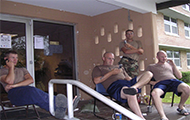
Collaboration/Communication Challenges Following Katrina Hurricane
- Dates: 2005
- Location: Seattle, WA
- Project Leads: Shelly Farnham
- Project type: Observational Field Study
In order to better understand the challenges specific to the deployment of collaboration technologies in crisis situations, we conducted an observational field study of the deployment of Groove Virtual Office to various civil and military groups at the heart of the disaster zone over the course of ten days. We summarize both general lessons learned from observations of social and communication challenges in crisis situations that impact technology adoption, and make specific recommendations for improving the deployment process of Groove to enable cross group collaboration.
Farnham, S., Kirkpatrick, R., Pedersen, E. (2006). Observation of Katrina/Rita deployment: Addressing social and communication challenges of ephemeral groups. In Proceedings of ISCRAM 2006, Newark, New Jersey.

